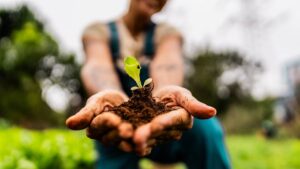$1 million funding for RLF AgTech as it enters strategic carbon alliance with CBA

RLF AgTech and CBA form alliance to fund a large-scale soil carbon pilot project Pic: Getty Images
Tech-driven plant nutrition company RLF AgTech and the Commonwealth Bank are joining forces to fund a large-scale soil carbon pilot project.
RLF AgTech (ASX:RLF) has announced that its wholly owned subsidiary, RLF Carbon Pty Ltd (RLF), has formed a strategic carbon alliance with the Commonwealth Bank of Australia (ASX:CBA).
The alliance will fund a large-scale soil carbon pilot program and enable RLF and the Big Four bank to work together to seek to expand the generation of Australian soil carbon credit units (ACCU) in the future at scale.
The transaction represents RLF’s first externally funded soil carbon project which supports the generation of carbon credits in commercial farming operations from growers in the domestic grain market.
RLF chose CBA as its provider of choice to form the strategic alliance and says it considers it an important validation of its tech with potential to generate large quantities of carbon credits.
RLF’s advanced plant nutrition products and proprietary system Accumulating Carbon in Soil System (ACSS, pronounced ‘ACCESS’) is tailor-made for seamless integration into contemporary commercial farming operations.
ACSS aligns with existing on-farm practices for easy adoption as part of their regular crop-growing processes.
By enhancing on-farm fertilisation practices, ACSS optimises efficiency, resulting in bountiful, superior crop yields and, ultimately, increased income for farmers.
If successful and applied at scale, carbon credits generated by RLF’s technology have the potential to help offset Australian and global emissions.
$1 million in carbon innovation support
RLF received $1 million in funding from CBA, in the form of a pre-payment for some of the ACCUs expected to be generated as a result of the pilot program.
CBA will also be entitled to purchase additional ACCUs generated from the Pilot Program at a discount to a rate based on available pricing in the spot market at the time.
As part of stage two of the alliance, CBA will refer potential soil carbon projects it considers suitable for deployment of the RLF carbon tech to RLF Carbon for commercialisation.
Finance a barrier
CBA Group executive of institutional banking and markets Andrew Hinchliff says its
clients tell the bank financing is the biggest barrier to mobilising carbon credit supply.
Hinchliff says capex is needed to support development of emerging carbon sequestration methods and technologies.
“A thriving carbon market is a significant economic opportunity for Australia and will play a vital role in the path to net zero,” he says.
“We want to play a leadership role in the development of this market, and we look forward to collaborating with Australian innovators to support piloting and scaling carbon projects across the country.
“We are providing funding to RLF’s pilot to support a promising and innovative agriculture technology that has the potential to generate large scale soil carbon.”
CBA managing director of global carbon Dr Yasmina Elshafei says soil carbon is a strategic focus for CBA because it wants to enable its agricultural clients to access carbon markets in a way that enhances and complements what they’re already doing and doesn’t out-compete for agricultural land.
“CBA is supporting the pilot by prepaying for carbon credits,” Elshafei says.
“The upfront funding we’re providing will assist participating farmers with covering the costs of registration, management and measurement that are associated with the project.”
Excited to join forces with CBA
RLF AgTech CEO Ken Hancock said the team is very excited to be working with CBA to make the generation of ACCUs at scale a reality.
“We look forward to delivering the potential of our products, technology, and system,” he says.
“Because soils have such a large storage capacity, holding three times the amount of carbon currently in the atmosphere and almost four times the amount held in living matter, soil carbon has a very important role to play in the world’s journey to net zero.
“If our relationship with CBA proves out the potential of our technology to generate carbon credits in the Australian grain industry, we look forward to deploying our products globally to make a significant impact in making farmers more efficient, profitable and to help in the fight against climate change.”
RLF announced the Clean Energy Regulator (CER) has approved its Hillston Soil Carbon Project – its Australian project.
The irrigated project involves a 45ha area of land 12km southeast of Hillston, in NSW.
This article was developed in collaboration with RLF AgTech, a Stockhead advertiser at the time of publishing.
This article does not constitute financial product advice. You should consider obtaining independent advice before making any financial decisions.
Related Topics
UNLOCK INSIGHTS
Discover the untold stories of emerging ASX stocks.
Daily news and expert analysis, it's free to subscribe.
By proceeding, you confirm you understand that we handle personal information in accordance with our Privacy Policy.








